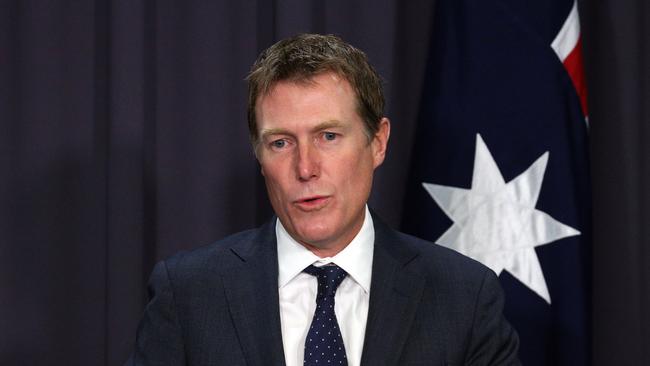Privacy safeguards important in spy-law overhaul
Christian Porter says privacy safeguards will be an important consideration of the biggest overhaul of spy laws in 40 years.

Attorney-General Christian Porter has signalled privacy safeguards will be an important consideration of the biggest overhaul of spy laws in 40 years, which is expected to result in more national security information shared with police and other law enforcement agencies.
Mr Porter said laws governing how intelligence information was shared between agencies needed updating because changes in the international security environment meant the “boundaries” between foreign and domestic threats had been blurred.
Following a report in The Australian, the Attorney-General confirmed yesterday the appointment of former ASIO head Dennis Richardson to oversee a review of the legal framework underpinning Australia’s intelligence agencies and their powers to investigate citizens.
The national security community has raised concerns that laws as they stand restrict the ability of overseas espionage agencies such as ASIS to pass on information to domestic security agencies such as ASIO.
Further frustration has emerged over limits on ASIO sharing practical information with frontline police officers making arrests of terrorist suspects, such as whether they are likely to be armed.
Mr Richardson, one of Australia’s most experienced career diplomats as a former head of both the Foreign Affairs and Defence departments and ambassador to Washington, will be asked to weigh up what oversight and citizen protection may be needed to stop abuses if intelligence agencies are given enhanced powers.
“There’ll always be appropriate restrictions, and anything that is done in this space of information-sharing needs to be done very cautiously, and keeping in mind appropriate rules and procedures around privacy,” Mr Porter said on Sky News.
Australia’s top law enforcement officer stressed, however, that the national security environment was constantly evolving amid threats and technology not encountered previously — and laws needed to keep pace.
Mr Porter’s comments reflect the government’s acknowledgment that, despite 10 batches of legislation to improve the response of security agencies to emerging threats, efforts have been hampered because international agencies often can share information at a local level only if special permission is granted.
It is accepted that boundaries are no longer defined with Australian jihadists working offshore with their Australian-based counterparts, using technology that can evade more traditional surveillance methods.
Mr Porter did not set out the terms of reference for a “top to tail” review by Mr Richardson. But he said the overhaul would focus on improving the “control, direction and co-ordination” of all security agencies and the way they interacted with non-intelligence agencies, including state police forces.
Labor yesterday signalled bipartisan support for the review, subject to its terms of reference.




To join the conversation, please log in. Don't have an account? Register
Join the conversation, you are commenting as Logout